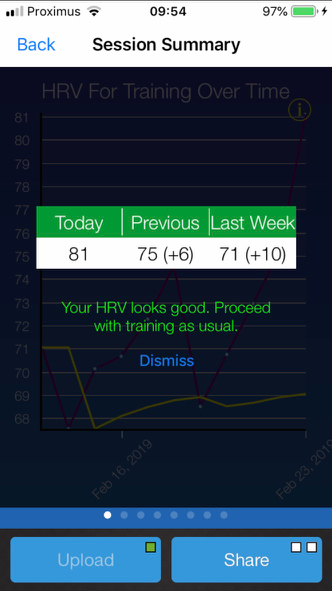What is heart rate variability (HRV)?
When we think of our heart rate, we think of a number that reflects the beats per minute (BPM). This number actually represents our average heart rate.
In reality, our heart rate changes from beat to beat. For example, when you inhale, your heart beat speeds up and when you exhale, it slows down. So an average heart rate of 60 BPM may actually vary between 55 and 65 BPM.
Heart Rate Variability (HRV) is a measure of this naturally occurring variation in the heart rate.
Research shows that lots of variation in the heart beat intervals, or high HRV, is a sign of a healthy nervous system.
What does my HRV tell me?
HRV is a “view” into what your nervous system is doing. There are two branches of the nervous system that work together to stay balanced. When you are stressed, one branch of your nervous system, the “fight or flight” branch, becomes very active. When this happens, HRV goes down and represents imbalance between the two branches. When the stressful situation passes, HRV goes up as the nervous system returns to normal.
High HRV is a sign of calm and low HRV is a sign of stress. The good news is that there are many simple solutions, such as deep breathing, that help restore calm and increase HRV.
So how do I use this in practice?
As an athlete, you know that getting enough rest after exercise is essential to high-level performance. Still, we often over train or feel guilty when taking a day off. The body strengthens and repairs itself in the time between workouts, and continuous training can actually weaken the strongest athletes. Rest is physically necessary so that the muscles can repair, rebuild and strengthen.
By measuring your HRV each morning, you get a result based on your baseline trend. That result can be ‘train as usual’, ‘low exertion day’ or ‘rest day’.
Basically your HRV tells you how much stress your body can handle that day, allowing you to act accordingly and take the guesswork out of when to train and when to recover.
How do I measure my HRV?
There are quite a few apps available. Any of the better ones require a good quality external heart rate monitor. The app I have found to be the highest quality is Sweetbeat HRV.
Can I use this for my horse?
As far as I have been able to find, we can not yet measure HRV accurately for horses. However, the basic principles of rest and recovery between trainings certainly apply! By creating more insight into your own recovery needs, you can use common sense to adapt your horse’s training.
The information for this blog post comes from sweetwaterhrv.com. There’s plenty more there if you are intrigued!

